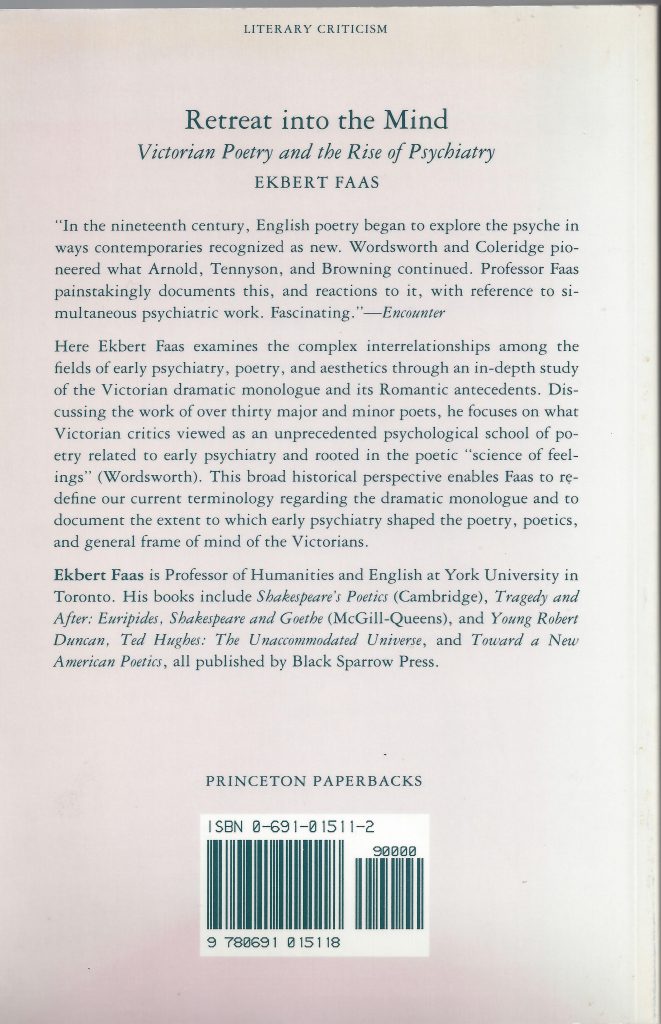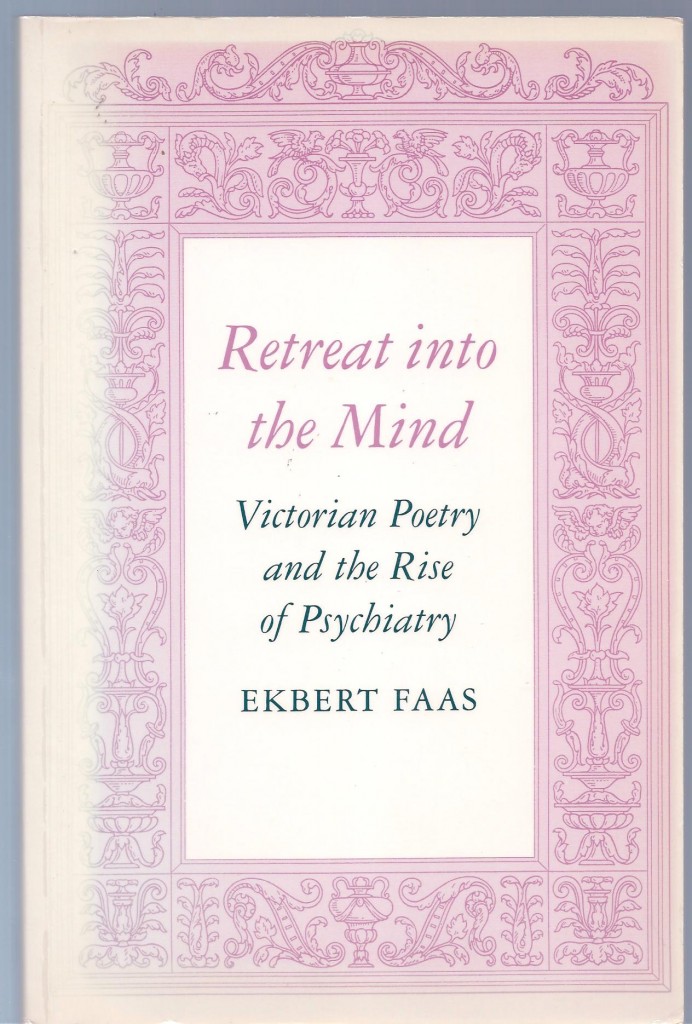 “Now Faas has turned to Victorian psychiatry and poetry, an intersection that narrows the distance between literature and medicine, demonstrating how each anticipates the other. Retreat into the Mind is a splendid book worthy of praise and congratulation, not only because it has dealt so judiciously with its subject, but also because it continues the pattern of searching out significant projects at a time when so much of what passes for scholarship replays old recordings. … Excellent.” (G.S. Rousseau, Isis, 83, 3, 1991, 581-82)
“Now Faas has turned to Victorian psychiatry and poetry, an intersection that narrows the distance between literature and medicine, demonstrating how each anticipates the other. Retreat into the Mind is a splendid book worthy of praise and congratulation, not only because it has dealt so judiciously with its subject, but also because it continues the pattern of searching out significant projects at a time when so much of what passes for scholarship replays old recordings. … Excellent.” (G.S. Rousseau, Isis, 83, 3, 1991, 581-82)
“The cumulative effect of the evidence Faas brings is persuasive in demonstrating the historical and theoretical points of intersection between poetry and mental pathology … For Faas, the chief precursors of the psychological content and dramatic form of the monologue were, on one hand, Wordsworth, with his ‘rigorous inquisition’ of the mind and his definition of poetry as ‘the history or science of feelings’; and, on the other, Shakespeare, whose ability to probe and to represent dramatically (especially in his soliloquies) the whole range of human thoughts and feelings was rediscovered and celebrated in the 19th-century. If Shakespeare provided dramatic models of pathological behaviour – as J.C. Bucknill and other alienists thought he did – then Wordworth (and Coleridge) pointed the way toward new possibilities for psychological poetry through the ‘greater Romantic lyric’ and the conversation poem … Perhaps most interesting from a psychoanalytic viewpoint, however, is Faas’ suggestion that the actual or implied ‘listener’ in dramatic monologues ‘tends to assume the role of the modern psychoanalyst toward his patient’ (p.151) … ‘The poets were there before me,’ Freud said, but Faas shows that poetry and 19th-century mental science also went hand-in-hand part of the way.” (J.Douglas Kneale, Psychoanalytic Books: A Quarterly Journal of Reviews, 2, 2, 1991, 239-243)
“In researching the book Professor Faas has scrutinized the works of some four hundred Romantic and Victorian poets, the reviews of their works in the nineteenth-century journals available at the British Library, and all the relevant critical writings of a more general nature. Additionally, he has read extensively in the books and journals of the period devoted to mental science and to the treatment of the insane. This breadth of study is reflected not only in the closely argued text, but also in the fifty pages of references and thirty-two pages of bibliography … his book is primarily written for students of English Literature, indeed he seems to have mapped out a rich seam for Ph.D studies. However, it is also of considerable interest to everyone interested in the history of ideas and to the student of the history of psychiatry.” (K.L.K. Trick, History of Psychiatry, 1,4, 1990, 434-435)
“Retreat into the Mind … is an attempt … to study the new psychological poetry of the nineteenth century – the greater Romantic lyric and the dramatic monologue – in its relationship to contemporary mental science. As Faas correctly notes, the development of early mental science, the role of the alienists (the mental physicians), and the relationship of each to the formation of nineteenth-century thought (artistic, religious, and social) has not previously been systematically studied. His approach is exhaustive … a major concern here was to obtain a sense of what Wordsworth’s and Browning’s contemporaries thought of this new psychological poetry and how they defined its diverse forms and techniques’ … The roots of the Victorian school are traced in the lives and works of the early Tennyson and Browning; to explore the full genealogy of the phenomenon Faas then works back through the Romantic ‘science of feeling’ and Shakespeare. The second half of the book is concerned with Arnold’s antipathy to psychology and his desire, particularly evidenced in the 1853 ‘Preface,’ for objectivity, and an analysis of the primary characteristics of the form and content of the dramatic monologue. It concludes with a chapter on Swinburne, whose Poems and Ballads is seen by Faas as marking the ‘beginning disintegration of the dramatic monologue as conceived by Victorian poets and critics’ (p. 120). Given the range of materials that Faas covers, Retreat into the Mind is a considerable achievement. He has quite literally mined contemporary commentary, and uses it extensively throughout his work to illuminate the nature and development of mental science and its complex relationship to psychological poetry.” (Thomas J. Collins, Victorian Studies, 33,4, 1990, 677-679)
“In this volume the author … takes a close look at the inter-relationship between poetry and mental science, in the Victorian era.” (Psychological Medicine, 20, 1990, 234)
“Retreat into the Mind is based on the careful scrutiny of ‘some four hundred Romantic and Victorian poets’ (5), plotting a line of continuity from Wordsworth and Coleridge, both of whom ‘had shown an increasing interest in mad monks, mad mothers, and idiot boys’ (177). The book expounds Browning’s penchant for pathological states of mind, and Tennyson’s interest in madness, dreams and visions, disease and abnormality: “If ever a poet had reason to worry about his sanity, it was Tennyson’ (53). The argument is extended to Morris’s depiction of necrophilia and homicidal fantasy (directions uncommon in previous dramatic monologues’ (180), and ends with Swinburne’s ‘Dramatisations of the Perverse’ (186).” (Kenneth Millard, Notes and Queries, March 1990,106-108)
